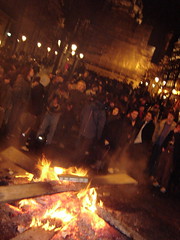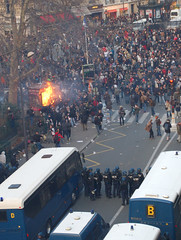
French gendarmes arrest a student on the Gare de Lyon rail tracks, as hundreds of demonstrating students blocked the rail tracks to protest against the new jobs contract in Paris, Thursday March 30, 2006.
On Wednesday a new French law took into effect making it a crime for anyone but "Professional Journalists" to record and distribute real-world scenes. The law is suppose to stop the practice of "happy slapping" where acts of violence are filmed and distributed on the Internet, however by going after anyone who is not a "professional Journalists" the French have made all citizen photo-Journalism a crime from a bystander filming an act of violence that they happened to witness to a film crew following the act of a terrorist so they can use it to spread fear.
The irony that this ruling comes exactly 16 years after George Holiday , an amateur videographer filmed Los Angeles police officers beating Rodney King.
What do you think French police will do with a "citizen Journalist" if they catch French police beating someone on tape? Rodney king story may never have been covered if only Los Angeles police were allowed to arrest George Holiday for being at the right place at the right time to capture the video.
Punishing everyone is not going to stop the filming of violence or the actually violent acts from happening it will just become harder to tell who filmed what and why they were in the right place to film it. Yes it is horrific that terrorists and criminals film acts of violence and then upload them to the Internet to recruit new members and spread fear across the world wide web But how will cracking down on the people who film these events lower crime?
It won't. What it will do is give the French police the new power to decided who define who is a "Professional Journalist" and who is just a "Citizen Journalists". Once you let the government the power to decided who can cover certain events they will pick those publications that are friendly to them and chase everyone else out on some technicality.
What if something similar to the Paris riots of last March that occurred after the French government pasted laws that made it easier for companies to hire and fire young workers?
After the French police are done tracking down the rioters they can now go after any citizen journalists that took pictures in a futile attempt to control the message and save face if anyone accuse the police of mistreating the rioters.


Thanks to "Citizen Journalists" uploading these pictures to Flickr the world got see a closer view of the story that was beyond the control of the police and the mainstream media.
The line between "Citizen Journalism" and "Professional Journalism" should never be drawn by the government. They are bound to use it to limit access and neglect the freedom of the press.
Besides "Citizen Journalism" is growing by leaps and bounds and the French will have a hard time trying to track pictures posted on the Internet back to the person who actually took them. If they don't check a "Citizen Journalist" in the act of taking pictures or "Happy Slapping" they may never check them on the Internet where no one has to identify themselves to upload pictures and content. There already is a magazine in Europe called cafebabel.com, that runs stories by hundreds of volunteer contributors around Europe and translates them into seven different languages with a staff of just nine people. They also have 20 local teams to propose subjects recruit writers and organizing "cafe Debates" and public forum to discuss social issues.
Here is good definition of a "Citizen Journalism" that was written by Mark Glaser a blogger for PBS MediaShift program.


No comments:
Post a Comment